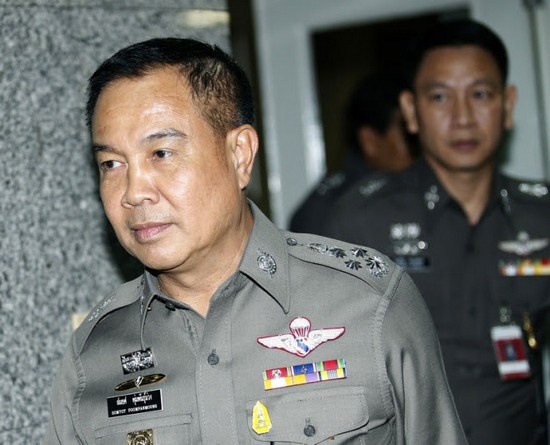Thai police Friday charged two Myanmar men with murder and rape after the killing of two British tourists on a southern island last month, in a case that has severely dented the kingdom's image as a holiday haven.

The charges come after police said the undocumented migrant workers had confessed to murdering Mr David Miller, 24, and Ms Hannah Witheridge, 23, whose battered bodies were found on Koh Tao on September 15.
The men have been charged with the murder of both Britons - a charge which carries the death penalty - and the gang rape of Witheridge, with police saying that their DNA matched samples taken from her body.
"The two Myanmar nationals are charged with murder (of both tourists), gang rape (of Ms Witheridge) and stealing," police chief Prachum Ruangthong of neighbouring Koh Phangan island, told AFP.
The breakthrough follows intense scrutiny of Thai authorities, which had been accused - in criticism led by the British media --of bungling the investigation in the days after the crime.
Earlier on October 3 police said the two men, who now face the death penalty for the charge of murder, had admitted to killing the Britons and raping Ms Witheridge.
"Two Myanmar suspects have confessed to killing the pair," Thai national police chief Somyot Poompanmoung told AFP. "DNA test results (from the two men) confirmed that the same DNA was found in the body of the (female) victim."
The two men were among three nationals from Myanmar held since October 2 on suspicion of involvement in the crime.
The third suspect is believed to be a witness and is currently under police protection on Koh Tao, provincial police chief Kiattipong Khaosamang told AFP.
The two Myanmar men, whose names police were unable to confirm, were taken to the island by investigators to recreate the crime scene on October 3, a common practice in Thai murder cases.
Hundreds of onlookers watched as the handcuffed men - wearing bullet-proof vests and white helmets - walked along the beach where the Britons were found dead, surrounded by scores of police officers on the normally tranquil island.
"Both men raped the female victim," Mr Kiattipong said earlier, adding the British pair were killed with a wooden stick and a garden hoe, which was found bloodied at the scene.
Thai authorities dismissed concerns that they have arrested scapegoats when questioned by reporters.
"Please be reassured that police have worked to their best ability so it's not possible that they have arrested scapegoats," Deputy Prime Minister Prawit Wongsuwon said on October 3.
- Police under pressure -
In the weeks since the crime, police have DNA-tested hundreds of people in and around Koh Tao and questioned dozens of people - including friends of Mr Miller.
They had come under intense pressure to solve the case after being criticised for mismanaging the probe by chasing the wrong leads and failing to lock down the island in the hours following the killings.
Journalists were allowed to trample all over the crime scene hours after the murders, while information - often erroneous - flowed out unfiltered until the intervention of the nation's top police officer.
The grisly double murders have delivered a fresh blow to Thailand's image as a tourist haven after months of political protests that ended in May's army coup.
Days after the murders, Thailand's gruff junta chief was forced into an apology after he suggested tourists in bikinis could be more vulnerable to attack -- comments that caused an international outcry.
With the peak tourist season fast approaching, Thai authorities are desperate to draw a line under the incident.
"I think the tourist confidence will improve," Minister of Tourism and Sports Kobkarn Wattanavarangkul told AFP, hours after the purported confessions.
Thailand's once-booming tourism industry was already scrambling to rebound from a slump in foreign visitor numbers after the coup and a night-time curfew tarnished its reputation as the "Land of Smiles".
The tourism ministry has estimated a more than eight percent drop in revenue from tourism this year -- down from 1.2 trillion baht ($37 billion) in 2013 to 1.1 trillion baht this year.



